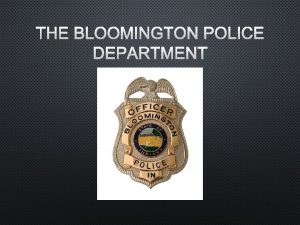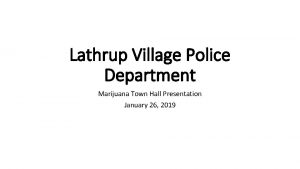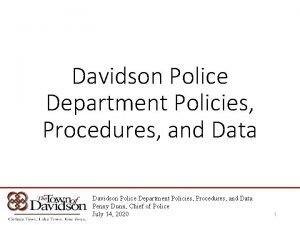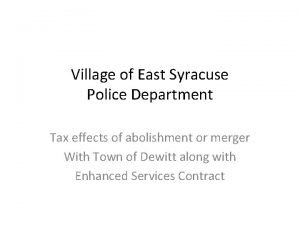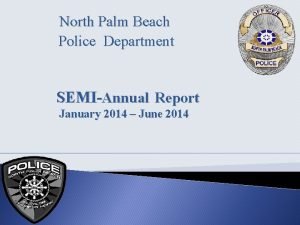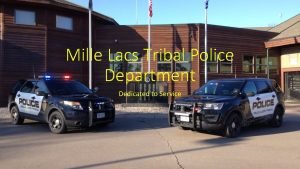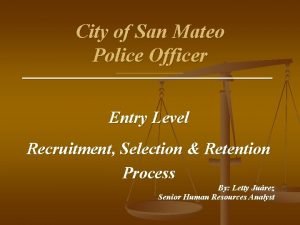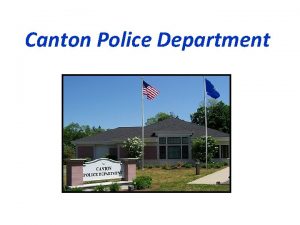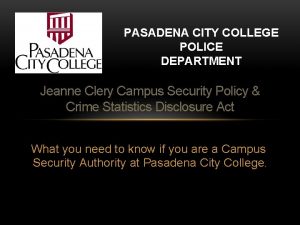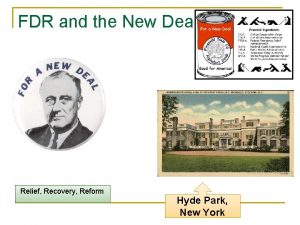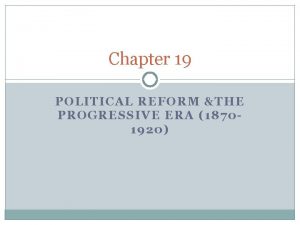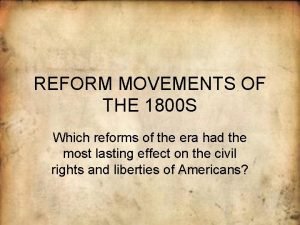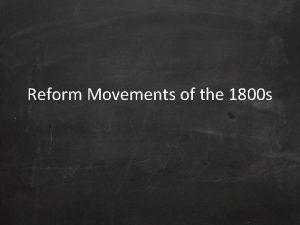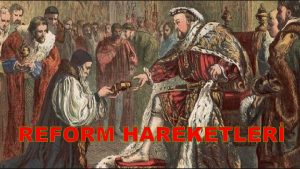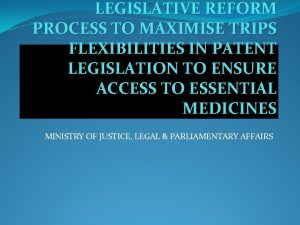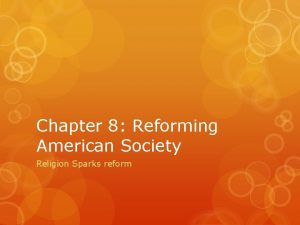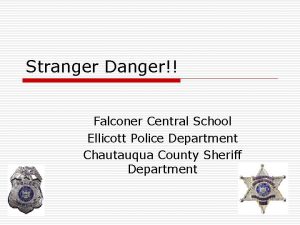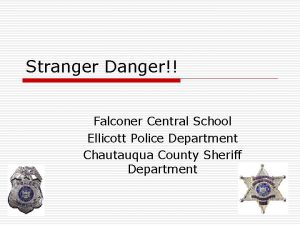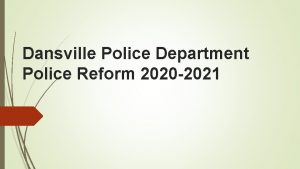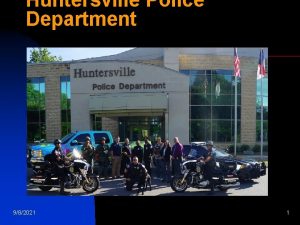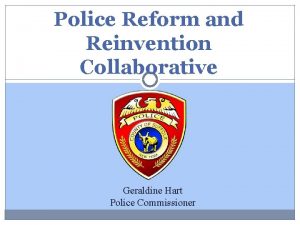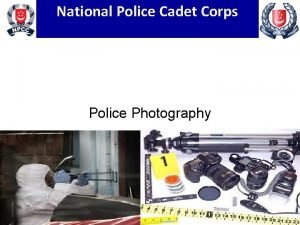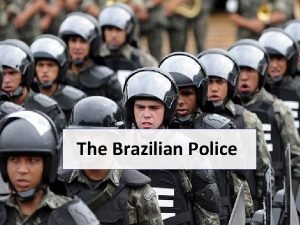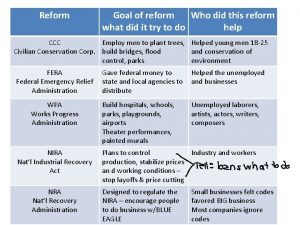Town of Ellicott Police Department Police Reform and





























































- Slides: 61

Town of Ellicott Police Department Police Reform and Reinvention Collaborative Police Chief William L. Ohnmeiss Jr. Town Supervisor Patrick W. Mc. Laughlin

Executive Order 203 - Compliance • The Town must perform a comprehensive review of current Ellicott Police deployments, strategies, policies, procedures and practices. • Chief Executive officer of the Town is tasked to call together the Police Chief and stakeholders in the community to develop a plan for any needed improvements to current deployments, strategies, policies, procedures, and practices. • The plan shall be offered for public comment, and after consideration of such comments, shall be ratified by Resolution or adopted by Local Law, no later that April 1, 2021. • The Town shall transmit a certification to the Director of the Budget that the process has been complied with and the Resolution or Local Law has been adopted.

Executive Order 203 – Compliance & Considerations • Promote community engagement to foster trust, fairness, and legitimacy • Address any racial bias and disproportionate policing of communities of color • Evidenced based policing strategies • Use of Force Policies • Procedural Justice • Systemic racial bias in policing • Implicit bias training

Executive Order 203 – Compliance & Considerations • De-escalation training and practices • Law Enforcement assisted diversion programs • Restorative Justice practices • Community based outreach and conflict resolution • Problem oriented policing • Hot Spot policing • Focused deterrence

Executive Order 203 – Compliance & Considerations • Crime prevention through environmental design • Violence prevention and reduction interventions • Model policies and guidelines promulgated by the NYS Municipal Police Training Council • Standards promulgated by the New York State Law Enforcement Accreditation Program.

Mandatory Stakeholders • Members of local law enforcement • Interested non-profit and faith based community groups • Members of community, with emphasis in areas with high numbers of police and community interactions • District Attorney • Public Defender • Local Elected officials

Reform & Reinvention Collaboration Process: Community Meetings • Town-wide community meetings – primary discussions on racial disparity • Open Door Policy of Police Chief. Invitation to anyone in the public to discuss issues. • Multiple discussions with community leaders in one on one settings • Continued collaboration & meeting with Police Chiefs

Reform & Reinvention Collaboration Process: Community Meetings - Ellicott • Public Safety Council & Police Administration • Faith Based leaders and organizations • Mental Health providers & organizations • Elementary School representatives • Middle/High School Representatives • Social Service Providers & Non – Profit Organizations • Law Enforcement, Probation, District Attorney

Reform & Reinvention Collaboration Process: Stakeholder Survey (Appendix) • Surveys completed by stakeholders in Town of Ellicott and county fire service: • • • Lakewood-Busti Jamestown Chautauqua County Sheriff Carroll Fire Chiefs and Fire Coordinators throughout all fire districts in Town of Ellicott

Reform & Reinvention Collaboration Process: Community Survey (Appendix) • Survey presented to all residents of county through web site, Facebook page, local media, and delivering of hard copies


Town of Ellicott History • The Town of Ellicott was formed on June 1, 1812. It was one of the three Townships first formed within Chautauqua County. In 1886 the Village of Jamestown was incorporated as a City and became a Municipality separate from the Town of Ellicott. In 1891 Falconer was incorporated as a Village within the Township; - as was Celoron in 1896. As the Villages and Town became more populated and settled it was necessary to provide for the enforcement of the Laws and Ordinances that had been enacted to protect and preserve the rights of all. Each of the municipalities within Ellicott provided Law Enforcement individually. This practice was suitable to the circumstances. The total census was not large, it was dispersed in “pockets” with a very “less mobile” lifestyle; - and the City of Jamestown was the “hub” providing industry, mercantile, and other sources of supplies for the daily needs. Over a period of time an increased transience within the industrial, retail, and mercantile sector from this “hub” (either to mergers, distant locations, local suburban areas, or going out of business) changed the demographics, character, and relatively of the City, the Town, and the Villages to each other. Prior to 1968, Ellicott had part time Officers providing coverage on a part time basis within the Township outside of the Villages. Celoron had a similar setup for the Village, while the Village of Falconer had a full time Police Department. On March 20, 1968 the Town Board established a bona-fide Police Department pursuant to the provisions of section 150 of the N. Y. S. Town Law. On April 15, 1968 the position of Chief of Police was established pursuant to N. Y. S. Town Law, N. Y. S. General Municipal Law, and N. Y. S. Civil Service Law. Prior to 1980 there were 11 full time sworn Officers and 8 part time sworn Officers employed among the three respective jurisdictions of the Town of Ellicott. On 6/1/81 the Village of Celoron dissolved its’ Police Department and became a part of the constituency of the Town of Ellicott Police Department. On 6/20/83, by voter referendum, the Village of Falconer dissolved its’ Police Department and also became a part of the constituency of the Town of Ellicott Police Department. Currently we have 13 full-time Police Officers, 11 part time Police Officers. We maintain a 24/7 patrol; - via 2 or 3 patrol units on an east – west assignment basis. We continue to evaluate, adjust, and improve our service delivery to meet the ever-changing needs for Law Enforcement within the Town of Ellicott.

Town of Ellicott Demographics (2010 Census) • Approximately 31 square miles • Population approximately 8, 700 • 97% Caucasian • . 8% African American • 1. 3% Hispanic • . 3% Asian • . 9% Multi-race • . 1% Native American

Agency Demographics – Law Enforcement • 24 Sworn Employees • • Chief of Police First Sergeant Detective Patrol Officers (15) School Resource Officers (4) Drug Officer

Law Enforcement: Divisions • Patrol • Criminal Investigation • Court Security • Records • Juvenile • Training • Forensic Investigation Member’s • Detective

Law Enforcement: Special Teams • SWAT • Drug Task Force Members • Evidence and Property Manager • Fleet Maintenance • Internal Affairs • School Resource Officers – Falconer & Southwestern

Current deployments, strategies, policies, procedures and practices • 12 Hour Patrol Shifts • 2 Patrol units • Supervisor 1 per Shift • 1 Detective – Hours as needed

Review of Policies • • Deployment Use of Force Policies Procedural Justice Racial bias Implicit Bias Vehicle and Traffic Policy Stop and Frisk * Department policy’s are available for public review upon request through the Chief of Police

Police Reform Survey • Wednesday, February 03, 2021 Powered by

50 Total Responses • Date Created: Wednesday, November 25, 2020 • Complete Responses: 50

Q 1: Please select the location of your residence or if you are not a resident the town of your employment • Answered: 50 Skipped: 0

Q 2: What stakeholder group do you belong to? • Answered: 47 Skipped: 3

Q 3: Please select local police department to provide feedback on • Answered: 50 Skipped: 0

Q 4: When was the last time you had a direct interaction with your local police agency? • Answered: 50 Skipped: 0

Q 5: Please select the top 5 services that you think are most important for your police department to provide • Answered: 50 Skipped: 0

Q 7: Police officers are a necessary part of your community • Answered: 50 Skipped: 0

Q 8: Police officers in your community are well trained. • Answered: 50 Skipped: 0

Q 9: Police officers in your community are responsive to the public's needs. • Answered: 50 Skipped: 0

Q 10: Police officers in your community are held accountable for their actions • Answered: 50 Skipped: 0

Q 11: Police officers in your community strive to have a positive impact on the community • Answered: 50 Skipped: 0

Q 12: Police officers in your community are fundamentally honest • Answered: 50 Skipped: 0

Q 13: If you have a complaint against your local police department or an officer, you are confident it will be heard and reviewed objectively • Answered: 49 Skipped: 1

Q 14: There is corruption in your police agency • Answered: 49 Skipped: 1

Q 15: Police officers in your community are biased in their interactions with certain groups of people • Answered: 50 Skipped: 0

Q 16: On a scale from 1 to 10, how satisfied are you with your police agency? (1 = Not at all satisfied, 10 = Extremely satisfied) • Answered: 50 Skipped: 0

Q 18: 16. Gender Identity • Answered: 49 Skipped: 1

Q 19: Race Identity • Answered: 47 Skipped: 3

Q 20: What is your age group? • Answered: 49 Skipped: 1

Q 21: What is your household income? • Answered: 47 Skipped: 3

Survey Results Summarized • 50 Respondents • 82% contact with police in last 5 years • Stakeholder Groups • • • 88% Community members 5% Emergency Services 3. 5% Law Enforcement 2% Elected or Appointed Officials 1% Community Liaison

Top Five Services Desired • Respond to 911 Calls for service • Investigations (i. e. sex crimes, robberies, homicides, etc. ) • Routine Patrols • Special Patrols (i. e. drunk driving, seat belt, speed enforcement) • Community Policing

Top Three Things to Improve Policing • Community Policing • Fair & unbiased policing, diversity training • Mental Health & de-escalation training

Community Beliefs of Law Enforcement • 92% believe Law Enforcement are necessary in community • 63% believe officers are well trained / 25% unsure or neutral • 71% believe Law Enforcement are responsive to public needs • 52% believe officers are held accountable for actions • 71% believe officers have a positive impact on community

Community Beliefs of Law Enforcement • 86% believe officers are fundamentally honest • 63% believe complaints against police are heard and reviewed objectively • 53% do not believe there is corruption in police 26% neutral/unsure • 54% do not believe officers are biased, 18% believe there is bias • Nearly 82% are satisfied with police in community

Oath Of Honor • On my honor, I will never betray my integrity, my character, or the public trust. • I will treat all individuals with dignity and respect and ensure that my actions are dedicated to ensuring the safety of my community and the preservation of human life. • I will always have the courage to hold myself and others accountable for our actions. • I will always maintain the highest ethical standards and uphold the values of my community, and the agency I serve.

Ellicott Police strive to follow Procedural Justice and Peel’s Principles. • Procedural Justice is based on four basic principles. 1. 2. 3. 4. Treating people with dignity and respect. Giving citizens a voice during encounters. Being impartial/neutral in decision making. Conveying trustworthy motives, transparency in action.

Peel’s Principles of Policing – past & present • The basic for which the police exists to prevent crime and disorder. • The ability of the police to perform their duties is dependent upon the public approval of police actions. • Police must secure the willing co-operation of the public in voluntary observation of the law to be able to secure and maintain the respect of the public. • The degree of cooperation of the public that can be secured diminishes proportionately to the necessity of the use of physical force.

Peel’s Principles of Policing – past & present • Police seek and preserve favor not by catering to public opinion, but by constantly demonstrating absolute impartial service to the law. • Police use physical force to the extent necessary to secure observance of the law or to restore order only when the exercise of persuasion, advice, and warning is found to be insufficient. • Police, at all times, should maintain a relationship with the public that gives reality to the historic tradition that the police are the public and the public are the police; the police being only members of the public who are paid to give full time attention to duties which are incumbent upon every citizen in the interests of community welfare and existence.

Peel’s Principles of Policing – past & present • Police should always direct their action strictly towards their functions, and never appear to usurp the powers of the judiciary. • The test of police efficiency is the absence of crime and disorder, not the visible evidence of police action in dealing with it.

Objectives and Training to be Obtained • Principled Policing – procedural justice, implicit bias, transparency, de -escalation • Outward Mindset – communication, de-escalation, community relationship development • Character Based Policing – supervisors • Crisis Intervention Team Training – mental health • Trauma Informed Policing

Future Goals and Objectives • Continued review and training in previous listed courses • Community Involvement –community stakeholder meetings – determine the needs of in various parts of the Township • Collaboration with Mental Hygiene to develop a robust mobile crisis response team – goal of a 24/7 operation • Develop a better Public Safety Model of Policing – Coactive Policing (working with community to solve problems) rather than reactive or proactive • Customer Satisfaction surveys

Future Goals and Objectives • Diversion : PAARI or L. E. A. D. • Community L. O. V. E. Gardens • • Learning about Each other Opening our hearts to each other Volunteering to be part of solution Empowering others to do the same

Future Goals and Objectives • Peer Support for all staff • Wellness Initiative for all staff • Restorative Justice (planning underway for youth, goal for adults also) • Focused Deterrence / “Pulling-levers” – specifically for drug enforcement – partner with social service, community partners and all police agencies. • Crime prevention through Environmental Design

Potential Obstacles to Change • Anti-Intellectualism • Violence • Corruption • Discourtesy • Fiscal Restraints • Time Restraints

Seven Improvement Steps: Envision We must cast a bold and breathtaking vision to ensure a distinguished future for policing. • Integrity • Courage • Character • Unconditional Respect

Seven Improvement Steps: Select Police must encourage and select the best and the brightest to serve as police officers. • Improve Recruitment • Police force that represents community

Seven Improvement Steps: Listen Police leaders must listen to their officers and members of the community. • Regular meetings with staff/officers • Regular community meetings – active listening

Seven Improvement Steps: Train and Lead Police leaders must implement professional training and a collaborative leadership style. • Utilize various disciplines to assist training • Collaborate with social service and non-profit organizations

Seven Improvement Steps: Improve Continuously Police must unceasingly improve the systems in which they work – everything we do.

Seven Improvement Steps: Evaluate Police must be able to critically assess, or have assessed, the crucial tasks and functions they are expected to perform.

Seven Improvement Steps: Sustain Police leaders must be able to maintain and continue improvements to their organization.
 Dredge bangla ltd
Dredge bangla ltd Karl friedheim
Karl friedheim Sin values
Sin values Bloomington indiana police department
Bloomington indiana police department New canaan police department
New canaan police department Lathrup village police department
Lathrup village police department Huntersville police report
Huntersville police report Palm coast sheriff
Palm coast sheriff Backbone of policing
Backbone of policing Davidson police department
Davidson police department Chain of police department
Chain of police department East syracuse police department
East syracuse police department North palm beach police department
North palm beach police department Northern nevada adult mental health
Northern nevada adult mental health Mille lacs police department
Mille lacs police department San mateo police department jobs
San mateo police department jobs Canton police officers
Canton police officers Qqalot
Qqalot Umass lowell police
Umass lowell police Pasadena city college police department
Pasadena city college police department Chapter 10 section 1 democratic reform and activism
Chapter 10 section 1 democratic reform and activism Chapter 10 section 1 democratic reform and activism
Chapter 10 section 1 democratic reform and activism Chapter 23 lesson 3 nationalism unification and reform
Chapter 23 lesson 3 nationalism unification and reform The ferment of reform and culture
The ferment of reform and culture Revolution brings reform and terror
Revolution brings reform and terror Taxation and budget reform commission
Taxation and budget reform commission Fdr three rs
Fdr three rs Chapter 19 political reform and the progressive era
Chapter 19 political reform and the progressive era The ferment of reform and culture
The ferment of reform and culture What was reform darwinism?
What was reform darwinism? Chapter 7 section 2 revolution brings reform and terror
Chapter 7 section 2 revolution brings reform and terror Chapter 15 the ferment of reform and culture
Chapter 15 the ferment of reform and culture Chapter 12 religion romanticism and reform
Chapter 12 religion romanticism and reform Chapter 23 section 2 revolution brings reform and terror
Chapter 23 section 2 revolution brings reform and terror The ferment of reform and culture
The ferment of reform and culture Second great awakening
Second great awakening Church reform and the crusades
Church reform and the crusades Chapter 14 section 1 church reform and the crusades
Chapter 14 section 1 church reform and the crusades Pcatp renewal form
Pcatp renewal form Chittibabu and chinnababu live in
Chittibabu and chinnababu live in Chittibabu and chinnababu live in
Chittibabu and chinnababu live in Stone town conservation and development authority
Stone town conservation and development authority What does janie say to jody on his deathbed?
What does janie say to jody on his deathbed? The spirit of reform lesson 1
The spirit of reform lesson 1 Was the tva a relief recovery reform
Was the tva a relief recovery reform Chapter 8 section 1 religion sparks reform
Chapter 8 section 1 religion sparks reform When was the education reform movement
When was the education reform movement Reform movements 1800s
Reform movements 1800s Reform 10.sınıf tarih
Reform 10.sınıf tarih Law reform process
Law reform process Land reform definition
Land reform definition Land tenure reform law
Land tenure reform law Late qing reform
Late qing reform Was the tva a relief recovery reform
Was the tva a relief recovery reform Grade 12 settlement geography
Grade 12 settlement geography Define the word reform
Define the word reform Chapter 8 section 1 guided reading religion sparks reform
Chapter 8 section 1 guided reading religion sparks reform An era of reform answers
An era of reform answers An era of reform chapter 18 answer key
An era of reform chapter 18 answer key Republic act no 55 agrarian reform
Republic act no 55 agrarian reform Besra meaning in education
Besra meaning in education Phrenology apush
Phrenology apush



